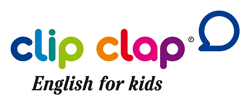FAQ's
When are babies ready to start the Clip Clap- English for kids programme?
We start with babies at the age of 1. At that age they are capable of giving meaning to the new language they are learning. They also begin to understand the meaning of words and phrases. Babies easily and effortlessly record the structures of the languages to which they are exposed.
But aren’t babies too young to learn a foreign language?
The sooner a child is exposed to a foreign language the better, since phonological and neuronal mapping in the brain is built in the first years of life. If babies are not exposed to the language during these years, their natural ability to learn languages is lost forever more.
Isn’t there a possibility for the child to mix up his mother tongue with English?
The human being has a natural ability to learn more than one language simultaneously without mixing them up. There are bilingual children all around the planet who can shift from one language to another depending on who is listening or talking to them without any difficulty or confusion. The Clip Clap – English for kids® programme respects the learning process of the baby. Parents must respect it as well. They should never insist on their babies’ showing them or other people what they have learnt, if the baby does not want to.
What can a baby learn?
Until they are three years old, babies can learn all the structures of one or more languages easily and naturally. The sooner a child is exposed to a foreign language the easier it will be for them to use its structures. The usage of the grammatical structures of this language will come up spontaneously, without having to think about them, unlike people who learn a foreign language at an older age.
Babies from non-English speaking homes can attain native-like English pronunciation?
We can say that at the age of three months babies are citizens of the world: their babbling is the same no matter where they live and what languages they are being spoken to. At four months, babies that receive input of more than one language realise whether they are being addressed to in one or another. These four-month-olds also begin to understand the meaning of words and phrases of these languages. When babies are eight months old, they can reproduce the sounds of the languages they have been listening to and their babbling already has an accent. Their world citizenship is now over and their capacity to imitate sounds accurately starts to fade. The earlier babies are exposed to English, the easier it will be for them to learn it with native-like pronunciation. The babies in the Clip Clap – English for kids® programme make the most of their early language learning capacity.
How long does the Clip Clap – English for kids® programme last?
The complete Clip Clap – English for kids® programme consists of seven courses. From the first course at the Nursery School (1-2 years old) up to the second course of Primary School (6-8 years old).
What happens if this English learning process is interrupted during a period of time?
Even if this English learning process were interrupted and taken up again, the new learning cycle would be easier for the baby than if there had been no previous learning experience.
Is it necessary for the parents to know English?
Parents do not need to know any English but can still cooperate in the learning process by showing approval in their baby's enthusiasm in class and when they are listening to the CD. Parents must be patient and respect the learning process of the baby.



